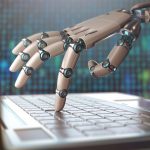Just 14% of Frontline Employees Have Received Training to Address How AI Will Change Their Jobs, but 86% of Employees Say They’ll Need It
Do you think you’ll need AI (artificial intelligence) training to get ahead in your job? In our ever-evolving world of work, technology shifts and expansions often act as a wake-up call for workers. As with the introduction of complex machinery and computers, artificial intelligence will change the nature of many roles – Goldman Sachs predicts that 300 million jobs will be lost or degraded by AI, and that generative AI could raise the global GDP by as much as 7%. It’s a highly-charged topic for those who feel threatened, and it seems inevitable that AI training for jobs across every sector is on the horizon.
As reported by PR Newswire, the Boston Consulting Group has surveyed 12,800 frontline employees, leaders and managers in 18 countries around the world. AI at Work: What People Are Saying is a bid to understand how artificial intelligence’s exponential advancements have impacted the workplace across multiple sectors.
“When Asked About AI’s Impact on Work, 52% of All Respondents Ranked Optimism as One of their Top Two Sentiments – A 17-Point Jump From 2018.”
– Boston Consulting Group
The organisation is quick to convey that it’s not all doom and gloom. 52% of respondents to the survey were optimistic about AI’s impact on their work – an increase from 2018 when its foothold in society was a lot less defined. Just 14% of frontline employees, however, say that they have had the requisite training to harness artificial intelligence efficiently, compared to 44% of leaders.
AI training for jobs – why it’s needed
A majority, 71% of all respondents of the Boston Consulting Group’s survey believe that the rewards of generative AI outweigh the risks, but 79% think regulations are necessary to curtail its potential rupturing of workplaces. Of course, those at the top are less likely to grouse about the impact of artificial intelligence – they won’t be the ones that face the chopping block.
“Generative AI is a rapidly evolving space, and its transformative impact is already being felt in workplaces around the world,” says Nicolas De Bellefonds, the global leader of AI and Software at BCG X, the group’s tech build and design unit, and co-author of the research. “Frontline employees” are classified as a worker that provides essential service or key public service, and it’s many of these vital services that run the risk of being made redundant.
What comes next
Artificial intelligence, of course, has tremendous potential to super-charge work and not just replace employees. The Boston Consulting Group’s conclusion acts as a call to arms for leaders to make this transition as smooth as possible, ensuring that there are spaces for responsible AI experimentation (and programming) and investing in upskilling.
“Generative AI burst on the scene so abruptly in 2022 that many companies are still playing catch up, however responsible AI should be a priority for all leaders,” shared Steven Mills, the group’s chief AI ethics officer. It’s up to leaders to embrace this change, and do right by their employees – planning is key.
It’s up to those in charge, to lead the charge, and do right by their committed workforce. After all, how else will we learn?
What do you think about AI integration? Feel threatened? Let us know.
Sunak and Biden are meeting to discuss the looming threat of artificial intelligence. Find out more here: AI and extinction: Biden and Sunak to Debate The Issue.











